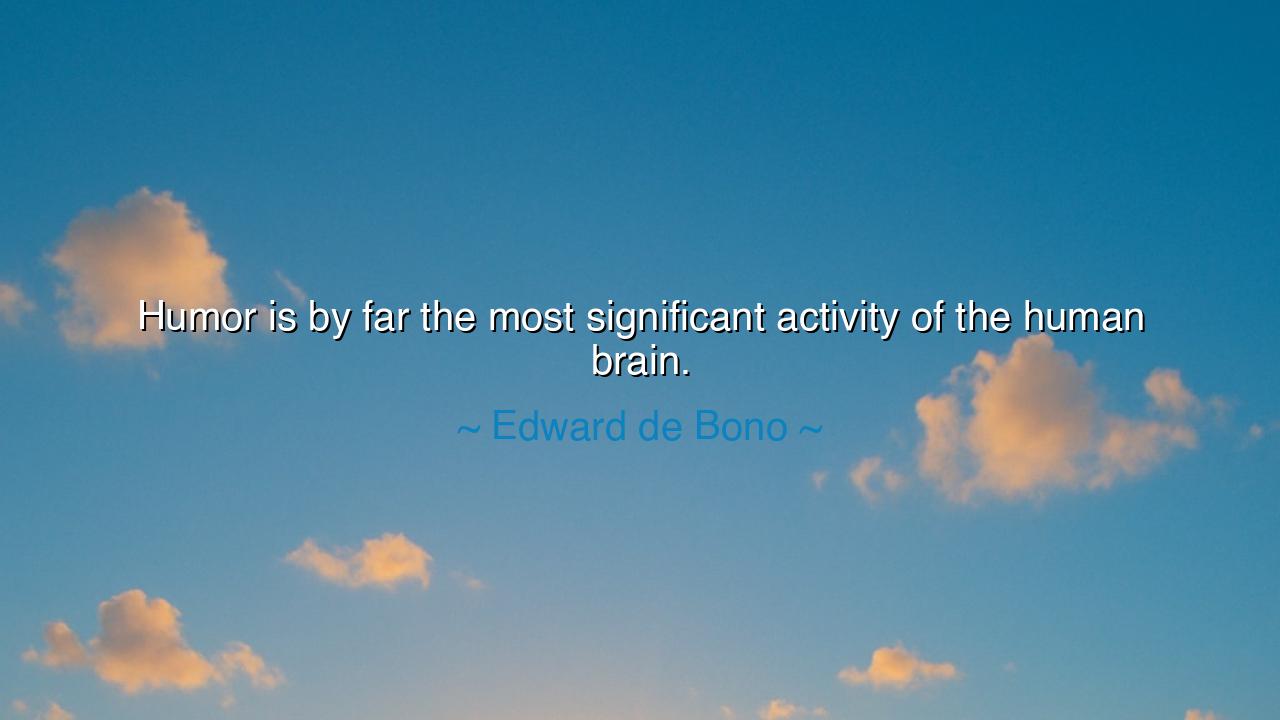
Humor is by far the most significant activity of the human brain.






In the vast landscape of human thought, where imagination and intellect weave together the fabric of civilization, Edward de Bono, the father of lateral thinking, once declared: “Humor is by far the most significant activity of the human brain.” To the untrained ear, these words may sound like exaggeration, but to those who understand the dance of reason and emotion, they reveal a truth both profound and eternal. For humor is not mere laughter; it is the highest expression of perception — the ability to see beyond the obvious, to grasp contradiction, to uncover light within shadow. It is the spark of divine intelligence that allows humankind to endure, to adapt, and to thrive.
De Bono, whose life’s work was devoted to exploring how the mind creates and innovates, understood humor as the essence of creative intelligence. When we laugh, we do not simply react — we recognize. We see connections where none seemed to exist; we catch glimpses of the absurd harmony beneath life’s chaos. The brain, in its moment of laughter, leaps from one pattern to another — swiftly, freely, beautifully. That leap, that sudden shift of understanding, is the same movement that creates art, discovers science, and solves the deepest problems of humanity. Thus, in humor lies not foolishness, but genius — the wisdom of flexibility, the mastery of perspective.
In the ancient world, the philosophers of Greece and the mystics of the East alike revered laughter as sacred. Socrates, whose irony often disarmed the proud, used humor as a tool to unveil ignorance and reveal truth. Through questions laced with wit, he made men laugh before they realized they were learning. And in the East, the Zen masters would often answer a question not with solemn instruction, but with a joke or a paradox — a moment that shattered logic and led the disciple to enlightenment. They, too, knew that laughter was the language of awakening. For humor is wisdom wrapped in surprise, and surprise is the beginning of insight.
To call humor “the most significant activity of the brain” is to recognize its role in survival as well as in art. In the darkest moments of history, humor has been the torch that kept the human spirit alive. Consider Viktor Frankl, the psychiatrist who endured the horrors of the concentration camps. He wrote that humor, even in suffering, gave prisoners a sense of inner freedom — a brief victory over despair. When a man could still laugh, he proved that his mind remained his own. Humor, in that sense, is not escapism; it is resistance. It is the mind’s rebellion against hopelessness, the proof that thought can remain light even in darkness.
De Bono’s insight reaches beyond mere philosophy; it is a call to expand our way of thinking. He devoted his life to breaking the chains of rigid logic — to teaching humanity how to think laterally, how to see new solutions by stepping outside habitual patterns. Humor, he argued, is the purest form of such thinking. The punchline of a joke, like the spark of invention, arrives unexpectedly — not through straight reasoning, but through a sideways leap. The laughter that follows is the mind rejoicing at its own agility. In this way, humor and creativity are twins — both born from the mind’s power to see differently.
Humor is also compassion made visible. It unites where argument divides. When two people laugh together, barriers fall, egos soften, and understanding grows. It is the closest thing to universal communication, transcending language, culture, and creed. A wise leader knows this — that a well-timed smile, a gentle joke, can bridge gaps that no speech could cross. The ancient kings and sages who led with grace often wielded laughter more effectively than command. For laughter is not just sound; it is the heartbeat of empathy, the reminder that all humans share the same absurd, beautiful imperfection.
So, let this teaching be remembered: cultivate your humor as you cultivate your wisdom. Let it be sharp, but never cruel; humble, but never hollow. Learn to laugh at yourself — for in doing so, you conquer vanity and awaken grace. Let laughter accompany your learning, your work, your love — for where humor dwells, creativity and kindness follow. The one who can find joy even in folly, who can smile through difficulty, is the one whose mind is truly free.
And thus, as Edward de Bono taught, remember that humor is not the absence of seriousness, but the highest form of intelligence. It is the music of the mind in harmony with itself. It is how thought breathes, how reason dances, how the soul remembers that it was born to play as well as to ponder. Cherish it, nurture it, and through it, you will touch the essence of both wisdom and humanity.






AAdministratorAdministrator
Welcome, honored guests. Please leave a comment, we will respond soon